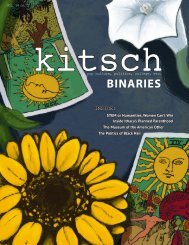Kitsch Magazine: Fall 2015
Binaries
Binaries
- No tags were found...
You also want an ePaper? Increase the reach of your titles
YUMPU automatically turns print PDFs into web optimized ePapers that Google loves.
SEEING DOUBLE<br />
a meditation on double majoring at Cornell<br />
by Alejandra Alvarez<br />
With my junior year well underway, thoughts<br />
concerning the impending reality of my life after Cornell and<br />
what I will do with it now occupy nearly ever corner of my<br />
mind. As a double major in English and Psychology, I have had<br />
to begin asking myself what I intend to do with these two<br />
degrees once the cap and gown have been shed and the fanfare<br />
of graduation has subsided. How will I apply the knowledge I<br />
have gleaned from these two degrees to my navigation of the<br />
professional world?<br />
I’ve reached far back into the mind I possessed as a<br />
freshman to remind myself why I chose to study these two<br />
disciplines in the first place. The resulting process of soulsearching<br />
has been a tumultuous one. Surrounded by some<br />
of the most brilliant and motivated minds in this world, I<br />
have had days where I have criticized myself for being too<br />
passive in my quest to land a position in graduate school or<br />
a job. Instead I have spent a disproportionate amount of time<br />
pondering how best to synthesize my two degrees. I believe<br />
this is a plight many a double major has faced.<br />
According to the U.S. Department of Education, the<br />
percentage of undergraduates choosing to double major<br />
increased by 96% between the years 2000 and 2008. Though<br />
the overall representation of double majors in the American<br />
collegiate body remains small (about 5.5 percent as of 2013)<br />
at some institutions upwards of 40 percent of students pursue<br />
multiple majors. Why the sudden and widespread urge to<br />
expand one’s academic horizons?<br />
Selecting a discipline to major in proves to be a<br />
complex decision for most undergraduates in the United<br />
States. Some enter as freshmen secure in their undecided<br />
status, content to spend their first few semesters taking<br />
a variety of courses in the hopes that one will nudge them<br />
in the professional direction that is right for them. Others<br />
check the box next to a specific major while filling out their<br />
Common Application and hit the ground running, taking the<br />
associated curriculum and seeing this academic path through<br />
to graduation. The decision to double major, however, entails<br />
a bit more than either of the two aforementioned categories.<br />
It requires a justification to oneself as well as to society and<br />
one’s family, a dedication to both subjects, and a vision of a<br />
future in either of the disciplines. But more importantly, it<br />
involves envisioning a future that ideally combines these<br />
disciplines.<br />
This is the beauty of the double major, a beauty that<br />
makes the occasional doubt from others as well as from yourself<br />
endurable. Nobody double majors for no reason—the decision<br />
to take on multiple majors is a thoughtful, well-constructed<br />
one that is more often than not in line with the true interests<br />
of a student. And for some students, two majors isn’t enough:<br />
Neil C. ‘17 is a triple major in Biology, French, and Government:<br />
“I was—and still am—extremely interested in microbiology, and<br />
felt that the Biology major was the best avenue for pursuing<br />
that. I chose the French major because my mother has a<br />
doctorate in French, and instilled a deep appreciation for the<br />
French language and culture within me. I have always been<br />
pretty interested in foreign policy, so I started the International<br />
Relations minor. Then I realized it might actually be easier to<br />
major in Government, so I am currently pursuing that as well.”<br />
For Neil, his decision to triple major was a confluence<br />
of personal affinity, interest, and practicality as he went on<br />
to tell me about his dreams of becoming either a member of<br />
the Armed Forces or a doctor. “If I become a doctor, then the<br />
humanities classes I have taken would encourage me to treat<br />
my patients as something greater than a collection of parts<br />
that require repair. I truly believe they would make me more<br />
conscientious and empathetic as a physician. If I were sent to<br />
war in some capacity, then I would have a better sense of the<br />
moral and historical ramifications of any actions I may have to<br />
take,” he said.<br />
The College of Arts and Sciences houses the most<br />
double majors I know at Cornell. I do not think this is a<br />
coincidence—the humanities lend themselves to double and<br />
triple majoring more than any other discipline here at Cornell,<br />
as well as in academia in general. As Neil’s experience and<br />
so many others’ may confirm, the A&S curriculum, due to its<br />
flexibility and its broad selection of humanities and STEM<br />
courses, very much fosters interdisciplinary study, or the<br />
application of certain concepts acquired in one discipline to<br />
those acquired in another.<br />
I myself have detected traces of some of the concepts<br />
in my Psychology courses in the content of my literary studies,<br />
and vice versa. Nothing that you learn in an English class is<br />
irrelevant or unconnected to something you discuss in an art<br />
history course; nothing you learn in a mathematics course<br />
can’t be traced along the arc of history or found in the archives<br />
of scientific discovery; no language you learn to speak will<br />
21




